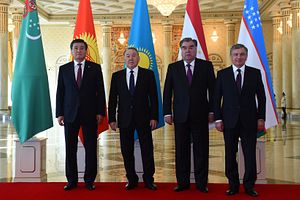Democracy is in retreat in much of the former Soviet Union, 27 years after its collapse. Freedom House’s annual Nations in Transit report, released today, marks democratic declines in 19 of the 29 countries included in the survey, the most in its 23-year history.
In the report’s overview, Nate Schenkkan, project director for Nations in Transit, writes that “[c]ontempt for independent institutions and open discussion has become entrenched from Central Europe to Eurasia.” Illiberalism, he writes, has “established itself as the new normal” across the regions covered in the survey. Schenkkan defines illiberalism as “an ideological stance that rejects the necessity of independent institutions as checks on the government and dismisses the idea of legitimate disagreement in the public sphere.”
Such illiberalism is familiar to Central Asia watchers, though as Schenkkan comments, the form of illiberalism taking root in Central Europe is “distinct from the violent authoritarianism that dominates the Eurasian half of the coverage area.” Think less outright detention for dissent and more smearing of the bearers of bad news. The report notes that the demonization of NGOs and journalists — labeling them “foreign agents” shilling for outside powers or accusing them of working against the nation’s interests — has spread from Central Asia and Russia into Central Europe and the Balkans.
A quick note on methodology before diving into Central Asia’s scores. The Nations in Transit report features reports on each included nation which discuss seven categories — national democratic governance, electoral process, civil society, independent media, local democratic governance, judicial framework and independence and corruption — which reflect on a country’s overall democratic atmosphere. A score of 1 to 7 is given for each category, with lower scores indicating higher levels of democratic progress. In sum, a lower score is reflective of a more democratic country. Estonia scored the best in the survey, at 1.82 and Turkmenistan the worst, at 6.96.
Three states in Central Asia marked declines in the 2018 report and Turkmenistan remained stagnant. Uzbekistan, however, recorded an improvement for the first time since 2005.
The report recognizes Uzbekistan’s “significant break with its past” trends as the “first, meager, shoots of spring.” Shavkat Mirziyoyev’s unconstitutional ascension to the acting presidency in the wake of Islam Karimov’s death and the pervasive nature of the “system Karimov built” are set against modest steps in improving the country’s media and civil society environments. “The country ultimately registered just quarter-point increases in two categories that had reached the absolute bottom in the Nations in Transit methodology,” the report notes. “The hard work in Uzbekistan still lies ahead.” Uzbekistan’s overall score came in at 6.89, quite near the rock bottom where it has long lingered. Recognizing improvements along with understanding the very low base from which those improvements stem is necessary to put progress in Uzbekistan in proper perspective. The road is long, the journey will be difficult — but as the report notes, “for the first time in over a decade, the future seems uncertain.” Uncertain is decidedly better than bleak.
Kyrgyzstan, which continues to have Central Asia’s best score, nevertheless remained in the consolidated authoritarian regime category with a score of 6.07. Despite a peaceful election and transfer of power in 2017, the heavy use of so-called administrative resources on behalf of outgoing President Almazbek Atambayev’s prefered candidate and ultimate winner Sooronbay Jeenbekov, the jailing of political opponents before the elections and investigations into Jeenbekov’s closest challenger, Omurbek Babanov, after prompted a decline in the country’s electoral process score. The country’s independent media rating declined as well, owing to shuttering of opposition media and heavy fines on critical outlets.
Kazakhstan recorded a decline, to 6.71, in part due to worsening civil society conditions — harassment of activists, journalists, lawyers, social media users, and religious communities — and negative changes in the realm of judicial systems. The full Kazakh report isn’t available yet.
Tajikistan continued its backward democratic march with its seventh consecutive year of decline — its score now sits at 6.79. The Tajikistan report, penned by Edward Lemon, highlights declines in four categories — civil society, indepoendent media, corruption, and local democratic governance. “For many Tajiks, life will change for the worse rather than the better in 2018,” Lemon writes, noting that the space for civil society and free speech will shrink further as the regime of President Emomali Rahmon, 65, marches toward elections in 2020 with a possible handover to his son, Rustam, on his mind. A de facto one-party state, Tajikistan seems destined for dynastic rule and democracy’s prospects low.
Turkmenistan remained stagnant democratically, near the absolute bottom with a score of 6.96. The Turkmenistan report is not yet available but there’s not much to say. Turkmenistan has posted scores of 7 (the absolute bottom) in five of the seven categories — electoral process, civil society, independent media, national democratic governance and judicial framework and independence — since at least 2004. In the 2017 report, corruption finally hit rock bottom too.
Central Asia remains the least democratic part of the region covered by the Nations in Transit report, and frankly contains some of the least democratic countries in the world. Further democratic decline in Kyrgyzstan — once triumphantly called the region’s Island of Democracy — bodes ill for democracy in the region, while Uzbekistan’s nascent reformation will need more time to either take hold in earnest or collapse. Turkmenistan, however, may be the most worrying. A country at the democratic rock bottom with an economy in crisis is a troubling specter in Central Asia.

































